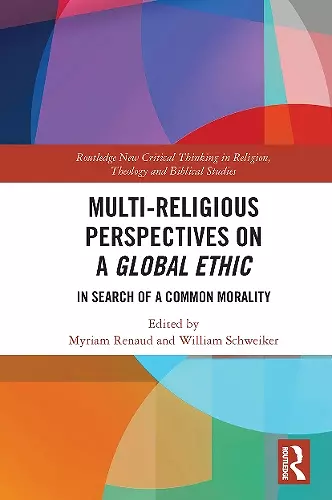Multi-Religious Perspectives on a Global Ethic
In Search of a Common Morality
William Schweiker editor Myriam Renaud editor
Format:Paperback
Publisher:Taylor & Francis Ltd
Published:30th May '22
Currently unavailable, and unfortunately no date known when it will be back
This paperback is available in another edition too:
- Hardback£145.00(9780367819958)

Ratified by the Parliament of the World’s Religions in 1993 and expanded in 2018, "Towards a Global Ethic (An Initial Declaration)," or the Global Ethic, expresses the minimal set of principles shared by people—religious or not. Though it is a secular document, the Global Ethic emerged after months of collaborative, interreligious dialogue dedicated to identifying a common ethical framework. This volume tests and contests the claim that the Global Ethic’s ethical directives can be found in the world’s religious, spiritual, and cultural traditions.
The book features essays by scholars of religion who grapple with the practical implications of the Global Ethic’s directives when applied to issues like women’s rights, displaced peoples, income and wealth inequality, India’s caste system, and more. The scholars explore their respective religious traditions’ ethical response to one or more of these issues and compares them to the ethical response elaborated by the Global Ethic. The traditions included are Hinduism, Engaged Buddhism, Shi‘i Islam, Sunni Islam, Confucianism, Protestantism, Catholicism, Judaism, Indigenous African Religions, and Human Rights. To highlight the complexities within traditions, most essays are followed by a brief response by an expert in the same tradition.
Multi-Religious Perspectiveson a Global Ethic is of special interest to advanced students and scholars whose work focuses on the religious traditions listed above, on comparative religion, religious ethics, comparative ethics, and common morality.
What can the religions contribute to the furthering of a Global Ethic, despite their very different systems of dogmas and symbols? This timely book grapples with my question and offers exciting answers. It also models engagement between the religions, highlighting the differences and nuances between them while also underscoring their desire for peace, understanding, and a certain degree of cooperation.
Hans Küng, Professor Emeritus of Ecumenical Theology, University of Tübingen,Principal author of the Global Ethic
The universal decency of reciprocity between communities and individuals coupled with recognizing the sanctity of the human being transcend historical and cross-border differences. If the world will ever truly become what it was created or evolved to be, we need a Global Ethic. And this creative, critical, and collaborate book pioneers the way. Celebrating particularity as it validates our common humanity. And that’s the best ethic of all.
Dwight N. Hopkins, Alexander Campbell Professor of Theology, University of Chicago Divinity School, Author of Being Human: Race, Culture, and Religion
Multi-Religious Perspectives on a Global Ethic: In Search of a Common Morality is an important and well-timed book for scholars and religious leaders that both celebrates and interrogates the Parliament of the World’s Religions’ Global Ethic. It is timely, as we confront our current global crisis, that scholars provide critical perspectives on the necessity of religion to speak to larger queries of ethics and morality.
Rosalyn LaPier (Blackfeet/Métis), Associate Professor, Environmental Studies Program, University of Montana, Author of Invisible Reality: Storytellers, Storytakers, and the Supernatural World of the Blackfeet
The Global Ethic is a remarkable collaborative effort to articulate a universal and persuasive account of what it means for conduct to qualify as moral or immoral. This volume’s outstanding contributors compare their respective religious traditions’ ethical thinking to the Global Ethic’s principles offering nuanced explorations of their traditions and evaluating the consequences of the Global Ethic’s principles on key issues like women’s rights and economic justice.
Purushottama Bilimoria, Senior Lecturer, Graduate Theological Union and University of Melbourne, General Editor of History of Indian Philosophy and Indian Ethics
When our lives have a foundation built upon the codes of conduct expressed in the Global Ethic—imparted to humanity over eons from those generative sources of the great saints, prophets and enlightened masters that gave rise to religions, but whose universal teachings transcend religions—we arrive at hallowed ground. The light of wisdom radiates from the meticulous and intense multi-perspectival inquiries presented here on what it means to be human.
Audrey E. Kitagawa, Chair of the Board of Trustees, Parliament of the World’s Religions
ISBN: 9780367640026
Dimensions: unknown
Weight: 394g
266 pages